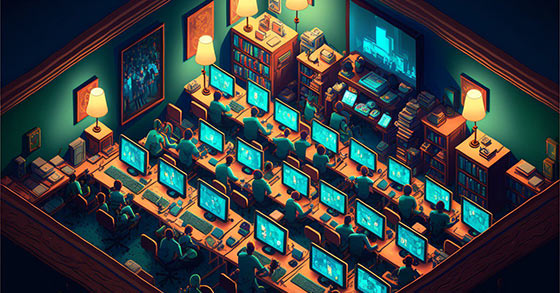Social Play – The Community Aspect of Gaming (2024 ed)

Gaming has always been a foundational social experience that connects people through shared challenges and victories. From arcades to today’s expansive online networks, the evolution of gaming has been marked by its ability to bring people together across the globe.
This journey from physical game rooms to virtual communities highlights how technology has revolutionized the way we interact.
The Roots of Social Gaming
In the early days, gaming centers like arcades were buzzing spots where players met up.
These places were about more than just games, since they were about making friends, sharing tips, and celebrating high scores together. This friendly atmosphere helped build a strong community feel among gamers, which was a big part of why arcades were so popular.
When home consoles like the Nintendo Entertainment System and Sega Genesis became popular in the 1980s and 1990s, the way people played games together started to change.
Instead of meeting up in public arcades, friends and families began gathering in their living rooms. Games designed for these systems often included features for multiple players, like couch co-op and competitive modes, keeping the spirit of shared play alive.
The Internet Era: A New World of Connections
The introduction of the internet revolutionized gaming by opening up a world where players could connect online.
This new era saw the rise of online multiplayer games, which broke down geographical barriers and allowed people from different parts of the world to play together.
Iconic games like World of Warcraft and Counter-Strike helped create large online communities where players could work together or compete against each other, no matter where they were located.
Social media platforms have also played a significant role in enriching the social side of gaming. Platforms like Twitch and YouTube allow gamers to share their gameplay experiences, stream live sessions, and interact with fans globally.
Social Casino Games: A Modern Twist on a Classic Concept
Social casino games represent a blend of traditional casino experiences with modern social interaction.
One of the highlights of social casino gaming is the inclusion of live dealer games, which offer a more immersive experience. Players can enjoy live variants of games such as blackjack, baccarat, and roulette games, where a real dealer orchestrates the game through a video link.
Additionally, social casino games are renowned for their competitive elements, such as leaderboards and tournaments. Slot game tournaments, for example, are a good example, as they offer a platform for players to compete against each other.
The Future of Social Gaming
The horizon of social gaming is expanding, promising even deeper levels of connectivity and interaction.
Technologies such as virtual reality and augmented reality are at the forefront, driving the creation of immersive environments that allow players to interact in previously impossible ways.
VR and AR are set to transform gaming by integrating real-world elements with digital experiences, making player interaction more engaging and lifelike. These advancements could potentially change the very essence of gaming, shifting it from a primarily visual and auditory experience to one that is truly multi-sensory.
In addition to technological advancements, developers are continuously working to enhance the social dimensions of gaming. Cross-platform play has emerged as a significant development, enabling players to connect and play together regardless of the hardware they own.
Whether someone is using a console, a PC, or a mobile device, this feature bridges the gap and promotes a more inclusive gaming culture.
More by Guest Author:
- Competitive dynamics in the world of digital entertainment (2024 ed)
- Farming Simulator 25 mods – downloading, installing & more
- Here are the top five most popular games of 2024 you need to play
- The role of music and soundtracks in creating immersive gaming worlds
- FS25 is coming this Fall (2024) with a large selection of mods
Tags: 22bet, Anime, Casino games, Casino video games, Crypto, Dundeeslots, Free spins, Gambling, Gaming, Mate Casino, Microgaming slots, Mobile games, Online Casino games, Online games, Slot machines, Streamers, Twitch





















